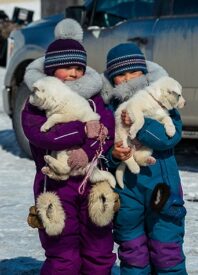
History is supposed to be a tool that helps us understand ourselves and where we come from. But who gets to decide which histories are passed on? In a diverse but colonial nation like Canada, history has disproportionately been shaped by the voices and views of powerful white men. The idea that the land that would later become Canada was discovered by European explorers in the 1400s, for example, is one such colonialist framing. After all, how can one discover a land that wasn’t lost? A land that was already home to many thriving First Peoples? As you will learn while watching Telling Our Story, explorers like Cartier were actually the ones who were lost, and ultimately found, by the First Peoples who saved them.
This new docu-series decolonizes history by disrupting the Eurocentric narratives that dominated our history curricula for so long. Instead, it centres the voices of the 11 First Peoples of Quebec. These groups are the Abenaki, Anishnabe, Atikamekw, Cree of Eeyou Istchee, Innu, Inuit, Mi’gmaq, Kanyen’kehà:ka (Mohawk), Naskapi, Wendat, and Wolastoqiyik (Maliseet). Created by award-winning Abenaki director Kim O’Bomsawin, the miniseries was made by a production team primarily comprised of First Peoples. Rather than the Orientalist stories that are so often told of indigenous communities, Telling Our Story is, as its title suggests, Indigenous histories told by First Peoples.
Innovative and entertaining as well as educational, the miniseries combines archival footage – and even some gorgeous animation – with interviews that feature First Peoples of all ages. We also have the opportunity to hear about devastating events from those who actually lived them, like Elisapie Natuara, whose family was part of an Inuit community the government forcibly relocated to Grise Fiord during The Cold War. The Canadian Government’s goal was to prove the High Artic was populated through this forced relocation. The impact was that people were made to live in an area that was two thousand miles North of the Northernmost village on the continent. There were no schools and there was no real community infrastructure. As Elisapie explains it, her mother and father had no idea what would await them when they were taken to Grise Fiord: “They lied to my parents.” As a Canadian settler who took an entire course in The History of The Cold War in university, I had not heard this story – a point that highlighted for me the profound importance of decolonizing the historical narrative.
While Telling Our Story poignantly explores horrific events, like the cultural genocide and child abuse that took place at Canada’s Residential Schools, it also includes many hopeful – even joyful – stories. For example, we meet a classroom of school children enrolled in an immersion program that teaches the Mi’gmaq language. While previous generations of children were forced to attend residential schools and forbidden from speaking their language, such immersion programs empower younger generations to discover the language of their ancestors. Karen Martin, a teacher at one such immersion program, explains that it helps her students learn “what it means on a deeper level to be Mi’gmaq.”
It should not be revolutionary for First Peoples to tell their own stories on CBC, and yet, in 2023, it still is. Ultimately, Telling Our Story is both a gorgeous and vital docu-series.
Telling Our Story is currently streaming on CBC’s Gem and will premiere on air on September 30th.
- Release Date: 9/30/2023
- Directed by: Kim O'Bomsawin
- Studio: CBC

